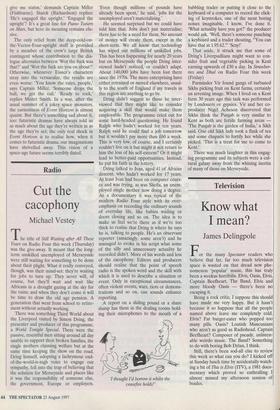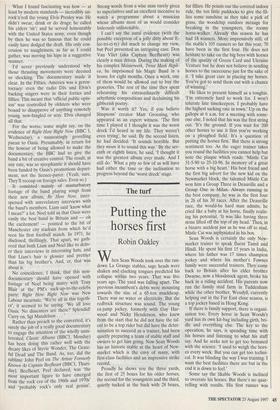Television
Know what I mean?
James Delingpole
For the many Spectator readers who believe that far, far too much television space is wasted on that dread new phe- nomenon 'popular' music, this has truly been a weekus horribilis. Elvis, Oasis, Elvis, Captain Beefheart, The Band, Elvis and more bloody Oasis — there's been no escaping it.
Being a rock critic, I suppose this should have made me very happy. But it hasn't because it so happens that all the people named above leave me completely cold. Elvis? Fat burger-eater who popped too many pills. Oasis? Loutish Mancunians who aren't as good as Radiohead. Captain Beefheart? Composer of pseudy, unlisten- able weirdo music. The Band? Something to do with boring Bob Dylan, I think.
Still, there's been sod-all else to review this week so what can you do? I kicked off at Sunday lunch time by accidentally watch- ing a bit of This is Elvis (ITV), a 1981 docu- mentary which proved so enthralling I almost missed my afternoon session of boules. What I found fascinating was how — at least by modern standards — incredibly un- rock'n'roll the young Elvis Presley was. He didn't swear, drink or do drugs; he called his elders `sir'; and he served honourably with the United States army, even though by then he was so famous that he could easily have dodged the draft. His only con- cession to naughtiness, as far as I could gather, was moving his hips in a suggestive manner.
I'd never previously understood why those thrusting movements were deemed so shocking. The documentary made it clear. In the Fifties, America was a geron- tocracy: even the radio DJs and Elvis's backing singers were in their forties and fifties. This meant that 'official public opin- ion' was controlled by oldsters who were bound to disapprove of anything remotely young, new-fangled or sexy. Elvis changed all that.
For the worse, some might say, on the evidence of Right Here Right Now (BBC 1, Wednesday), a nauseatingly grovelling paean to Oasis. Presumably, in return for the honour of being allowed to make the documentary, the BBC had to give the band a bit of creative control. The result, at any rate, was so sycophantic it should have been funded by Oasis's promotions depart- ment, not the licence-payer. (Yeah, sure. They'll recoup on foreign sales. Even so.) It consisted mainly of masturbatory footage of the band playing songs from their new album, Be Here Now, inter- spersed with unrevelatory interviews with the band's members. Liam said 'know what I mean?' a lot. Noel told us that Oasis were easily the best band in Britain and — oh the excitement! — pointed to the bit of Manchester city stadium from which he'd seen his first football match. In 1971, he disclosed, thrillingly. That apart, we gath- ered that both Liam and Noel like to deliv- er their interviews in interesting hats, and that Liam's hair is glossier and prettier than his big brother's. And, er, that was about it.
No coincidence, I think, that this non- documentary should have opened with footage of Noel being matey with Tony Blair at the PM's suck-up-to-the-celebs party: Right Here Right Now was New Labour incarnate. 'We're all in this togeth- er', it seemed to be saying. 'We all love Oasis. No dissenters are there? Splendid! Carry on, Sgt Mandelson . . . ' Rather than preach to the converted, it's surely the job of a really good documentary to engage the attention of the wholly unin- terested. Classic Albums (BBC1, Monday) has been doing this rather well with the dreary likes of Stevie Wonder, The Grate- ful Dead and The Band. As, too, did the sublime John Peel on The Artiste Formerly Known As Captain Beefheart (BBC1, Thurs- day). Beefheart, Peel declared, was 'the most important figure to have emerged from the rock era of the 1960s and 1970s' and 'probably rock's only real genius'. Strong words from a wise man rarely given to superlatives and an excellent incentive to watch a programme about a musician whose albums most of us would consider hideously unlistenable.
I can't say the aural evidence (with the possible exception of a jolly ditty about E- lec-tri-ci-ty) did much to change my view, but Peel presented an intriguing case. Don Van Vliet (aka Captain Beefheart) was clearly a man driven. During the making of his complex Meisterwerk, Trout Mask Repli- ca, he imprisoned his Magic Band in a house for eight months. Once a week, one of them would be allowed out to buy the groceries. The rest of the time they spent rehearsing his extraordinarily difficult arhythmic compositions and declaiming his gibberish poetry.
Was it worth it? Yes, if you believe Simpsons' creator Matt Groening, who appeared as an expert witness. 'The first time I played it I thought it was the worst dreck I'd heard in my life. They weren't even trying', he said. By the second listen, he had decided: 'It sounds horrible. But they mean it to sound this way.' By the sev- enth or eighth listen, he said, 'I thought it was the greatest album ever made. And I still do.' What a pity so few of us will have had either the time or the inclination to progress beyond the 'worst dreck' stage.



























































 Previous page
Previous page